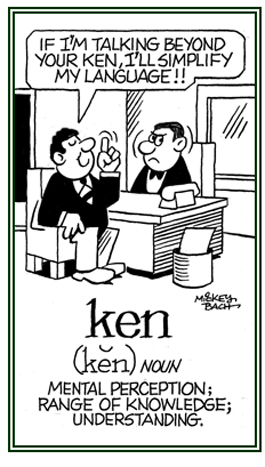English Words in Action, Group K
(a variety of English words which have developed through history and are currently used in our modern age)
Simply click on this banner (or the following link) and you will be on your way to stimulate your brain for greater word comprehension with quizzes based on some of the words in this unit.
2. Being wholehearted, eager, and enthusiastic: Lawrence and his family were keen about going to the picnic this afternoon.
3. Used to describe a discriminating, acute, and passionate attitude about something: Sharan has a keen appreciation of art works and so she goes to various exhibitions whenever she can.
2. Part of a castle, stronghold, or fortress: The ruins of the medieval keep are still standing after hundreds of years.
3. Etymology: in the sense of "stronghold inside a castle" is a translation of Italian tenezza, "keep, stronghold, donjon" (fortified main tower of a castle), and was introduced by Sir Philip Sidney into English in his classic romance of 1590 titled Arcadia.
2. To support, preserve, or ensure the future of: Susana wanted to keep her family name when she got married.
3. To maintain, to make provision for, or to care for: Sabina agreed to keep her niece for a week while her parents went on a business trip.
4. To protect, hold back, or to prevent the movement of someone or something: The police officers were told to keep everyone away from the accident!
5. To proceed, to continue, to move in a direction: Please, keep moving to the entrance.
6. To go along with, to observe, to maintain: Elva and Alfred want to keep the religious holidays.
7. Etymology: from Old English cepan, "to observe, to see, to comply with".
2. A person who is a guardian, custodian, or curator for objects: Helene was the keeper of the art collection for her uncle.
3. Custodian, protector, nurse, or a provider of care and supervision: Glenda ended up being her brother's keeper after he was seriously injured during an auto accident.

Go to this Word A Day Revisited Index
so you can see more of Mickey Bach's cartoons.
Gertrud's kid sister will be having her birthday party this week and her kid brother will have his celebration next month.
2. Young goats: On the farm, Jim saw several mother goats with their kids.
There are those who object to the use of the term kid or kids for youngsters and say: "Kids are young goats and so children should NOT be referred to as kids; unless they behave like young goats!"
3. Etymology: from Middle English kide and from Old Norse kidh, "a young goat" or a similar animal; such as "an antelope"; then, the informal slang-term came into existence for "a child" or "a young person" to be called kids.Kids Say the Funniest Things
There are elementary school teachers who apparently agree with that title, because they keep journals of amusing things their students have written in papers as shown in the following list:
- The future tense of "I give" is "I take".
- The parts of speech are lungs and air.
- A census taker is man who goes from house to house increasing the population.
- Water is composed of two gins. Oxygin and hydrogin. Oxygin is pure gin. Hydrogin is gin and water.
- The definitions of H2O and CO2: H2O is hot water and CO2 is cold water.
- Most of the houses in France are made of plaster of Paris.
- The spinal column is a long bunch of bones where the head sits on the top and you sit on the bottom.
- We do not raise silk worms in the United States, because we get our silk from rayon who is a larger worm and gives more silk.
- One of the main causes of dust is janitors.
- One by-product of raising cattle is calves.
- The four seasons are salt, pepper, mustard, and vinegar.
- The word trousers is an uncommon noun because it is singular at the top and plural at the bottom.
- Syntax is all the money collected at a church from sinners.
- The blood circulates through the body by flowing down one leg and up the other.
- Iron was discovered because someone smelt it.
- The law of gravity says no fair jumping up without coming back down.
- A vibration is a motion that can't make up it's mind which way it wants to go.
- I'm not sure how clouds are formed, but clouds know how to do it, and that's the important part.
- Water vapor gets together in a cloud, then when it gets big enough to drop, it does.
- Rain is saved up in cloud banks.
Jack responded by saying, "Are you trying to kid me?"
Shirley answered, "Jack, I kid you not; let's do it. No, I'm only kidding you!"
Sometimes politicians are considered to be nothing more than kidders who should not be taken seriously when they make promises to improve this or that situation for the people.

Go to this Word A Day Revisited Index
so you can see more of Mickey Bach's cartoons.
The term, knee-jerk, often has a negative connotation; such as, being too-hasty, to impulsive, and perhaps even being an irrational or unacceptable response.
2. Etymology: Kop is a hill or a headland; from Afrikaans which came from Dutch, "a head" and kopje also came from Afrikaans, a diminutive (small form) of Dutch, kop, "hill".
Links to all of the groups of English words in action, Groups A to Z.
You may see the bibliographic list of sources of information for these words in action.
